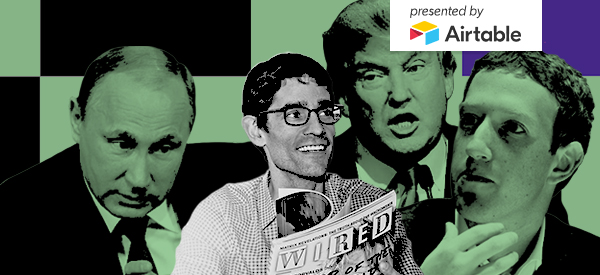Secure your place at the Digiday Media Buying Summit in Nashville, March 2-4
Wired’s Nick Thompson: Facebook needs to pivot news feed to quality

Subscribe: iTunes | Google Play | Stitcher
Nick Thompson, editor-in-chief of Wired, recently co-authored a story on how the 2016 election shook Facebook and catapulted them into an identity crisis. As he investigated this story over two years, it refined his own digital strategy and views towards Facebook’s role in the business of news.
“The fundamental thing I want Facebook to do is change news feed so that it rewards quality content,” said Thompson on this week’s episode of the Digiday Podcast. “If you write a story that isn’t on the moment, it will not travel on Facebook, even if it makes people feel informed and educated. By changing the way news feed is measured and changing the data points that go into creating the news feed, I hope the news feed is where quality thrives — focusing on time well-spent, prioritizing trust-worthiness, informed-ness, quality content.”
Thompson discusses the story, what it means when the world of Silicon Valley collides with Washington, why he remains optimistic about Facebook’s interests aligning with publishers’ interests, and more.
Edited highlights below.
Facebook didn’t want to control the news cycle.
“They didn’t get into the news business with the expectation that they would become the most powerful force in American media. They got in because they wanted to quash Twitter. Facebook is really good at quashing threats. They tried to recreate Twitter inside of Facebook. They did it very well and generated tons of power and suddenly they control the flow of news in America. They woke up one morning and said ‘oh no! we own the news.’”
Facebook is at the stage of acceptance.
“The 2016 election was a real shock. The executives had known Trump was using Facebook more effectively than Hillary [Clinton] was but they didn’t think it would lead him to win. Zuckerberg asked people who run the news feed for the percent of content was fake news. He gets back a small number. Then in an interview, he said that the idea that fake news affected the election is “pretty crazy”. But the last two years have been an education about their influence, their power, their ability to possibly flip an election and a lot of understanding on how to work with the government.”
The relationship with media is difficult but Facebook has listened.
“They have an incentive in cultivating us to make sure we don’t write ‘Break up Facebook.’ Facebook has listened and changed. Zuckerberg was opposed to paywalls within Instant Articles. Campbell Brown goes on a listening tour. Publishers are pushing paywalls. Facebook listens, they allow paywalls in Instant Articles but they set it to ten articles a month, which is an impossible level because nobody will ever hit it. Then last week, Facebook lowered it to five because they feel pressure from the publishers.”
Getting carriage fees from Facebook could create serious consequences for the media.
“On one hand, it is recommended that Facebook pays media content for their content. Facebook has actively taken away most of the ad market. On the other hand, is it good for the media industry to be getting checks from Facebook? Then what happens to our independence? If Murdoch gets that, and we do start getting carriage fees and it’s a significant portion of our budget, then think about the crazy dynamic that will have, the threat. Then they will not only have a dial over our traffic, but they will also have carriage fees.”
Google is way ahead of Facebook in working with publishers.
“The way the Facebook Journalism Project was explained to us as a way to copy Google’s News Lab. Google is years ahead of Facebook in a lot of ways, like ranking publishers by quality. The trustworthiness stuff that Facebook is introducing now, Google has had that for years. Facebook is just coming around subscriptions, Google put them right into AMP. Google has much better relationships with industry, they have made it easier for publishers. Google’s fundamental incentive is to make the open web a good place, Facebook’s incentive is to get everything to move inside of Facebook.”
More in Media

Media Briefing: Turning scraped content into paid assets — Amazon and Microsoft build AI marketplaces
Amazon plans an AI content marketplace to join Microsoft’s efforts and pay publishers — but it relies on AI com stop scraping for free.

Overheard at the Digiday AI Marketing Strategies event
Marketers, brands, and tech companies chat in-person at Digiday’s AI Marketing Strategies event about internal friction, how best to use AI tools, and more.

Digiday+ Research: Dow Jones, Business Insider and other publishers on AI-driven search
This report explores how publishers are navigating search as AI reshapes how people access information and how publishers monetize content.








